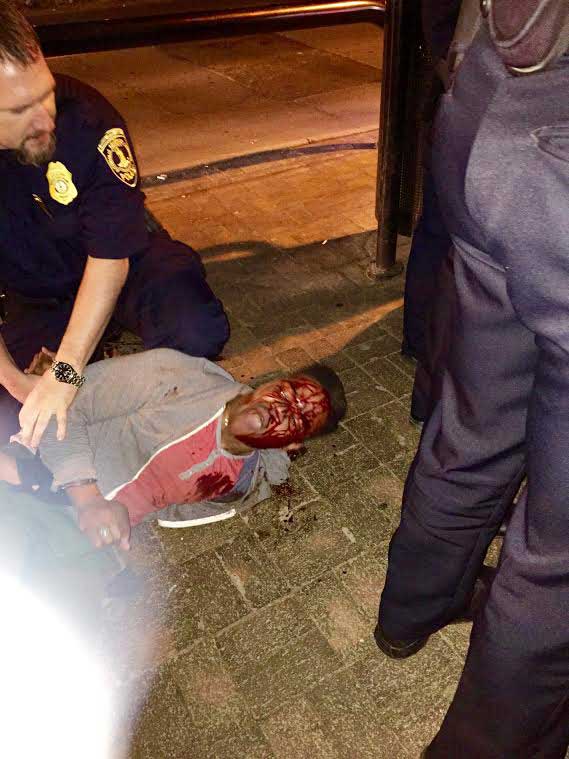
Just when the national spotlight seemed to have shifted away, the University of Virginia is reeling again.
Students took to a campus amphitheater Wednesday night and to social media Thursday in protest after the violent arrest of a black student by white law enforcement officers was caught on video that depicted the incident in bloody detail. It comes just months after the university found itself at the center of a national firestorm over a Rolling Stone report about an alleged gang rape at a fraternity house—a report whose veracity has since come into question but nevertheless had the school in crisis mode for weeks.
Now the arrest of Martese Johnson, a 20-year-old member of the school’s prestigious Honor Committee who shouted “you f–king racists” as officers slammed him onto the ground, has students and administrators in Charlottesville on edge again.
“The picture really is quite haunting,” Nicholas Hine, a student who serves with Johnson on the Honor Committee, told TIME of the graphic image, which shows Johnson, blood streaming down his face, looking up as an officer kneels over him. “The feeling on campus is sort of across the board that people are appalled and upset by the way Martese was treated.”
“Martese is a respected student leader, a great friend, and a valued member of Honor Committee,” Hine added. “I know that he is a guy with an upstanding character and I’m as shocked as anyone that this has happened.”
It’s been a difficult school year for the University of Virginia. Last fall, the university community suffered from the disappearance and murder of student Hannah Graham, two student suicides, and the Rolling Stone controversy.
And now this.
UVA President Teresa Sullivan moved quickly to contain the situation with a statement Wednesday in which she said “every member of our community should feel safe from the threat of bodily harm and other forms of violence.” She asked Virginia Gov. Terry McAuliffe to investigate (it was agents from the state-run Department of Alcoholic Beverage Control who arrested Johnson early Wednesday morning outside an Irish pub in Charlottesville). McAuliffe has directed state police to probe the matter.
“I felt it in my stomach,” Sullivan told local TV station WTVR. “Seeing the blood run down that young man’s face. I wanted to know what had happened and why it had happened. And I have to say, I also thought about his mother.”
The arrest also raised new questions about the Department of Alcoholic Beverage Control, which settled a lawsuit in 2014 brought by a student after agents arrested her, mistaking sparkling water for alcohol.
The department said in a statement shortly after the incident that agents “observed and approached [Johnson] after he was refused entry to a licensed establishment. A determination was made by the agents to further detain the individual based on their observations and further questioning. In the course of an arrest being made, the arrested individual sustained injuries.”
“Virginia ABC is restricting the special agents involved in the incident to administrative duties while the investigation is underway,” the department added.
Against the backdrop of multiple incidents of police use-of-force against black men that have drawn national attention since last summer, students are using the latest episode to address issues of racism they say persist in Charlottesville.
“Over the course of the past year, members of our community have expressed dismay and frustration at national events involving the excessive use of force by police officers. Now this issue lands closer to home,” the UVA Student Council said in a statement to students . “In this difficult time, we must continue working to build a community that does not tolerate these types of actions.”
And a group of UVA students were using the Twitter hashtag #BlackUVaDemands on Thursday, seeking action from the university. “#BlackUVaDemands the acknowledgment that UVa is not currently a mentally or physically safe space for black students,” read one. “#BlackUVADemands UVa Administration acknowledge that simply establishing a diversity office to address social issues is not enough,” read another.
Abraham Axler, a sophomore and the incoming student council president, said the student council is currently focused on how law enforcement in Charlottesville treats students, particularly minorities.
“I think it would be short-sighted if we didn’t take the opportunity to look more broadly at how law enforcement treats black students,” Axler said.
Charlottesville Police, whose officers weren’t involved in the arrest, planned to send representatives to a meeting of students Friday afternoon to discuss the matter.
“We have to vigorously engage with law enforcement on how they are treating young black men.” Axler said. “This kind of discomfort that this community is feeling—this is what they feel every day as minority students.”
More Must-Reads from TIME
- Donald Trump Is TIME's 2024 Person of the Year
- Why We Chose Trump as Person of the Year
- Is Intermittent Fasting Good or Bad for You?
- The 100 Must-Read Books of 2024
- The 20 Best Christmas TV Episodes
- Column: If Optimism Feels Ridiculous Now, Try Hope
- The Future of Climate Action Is Trade Policy
- Merle Bombardieri Is Helping People Make the Baby Decision
Contact us at letters@time.com